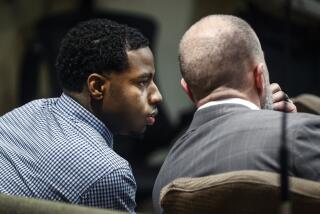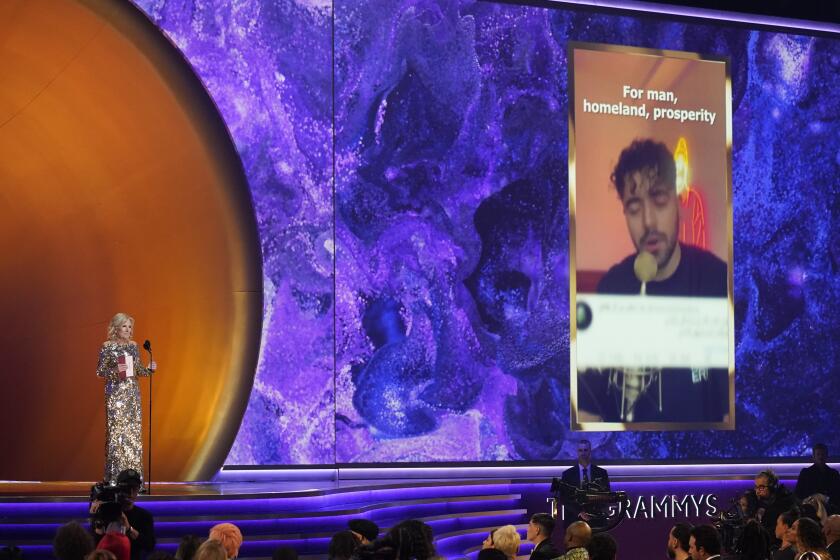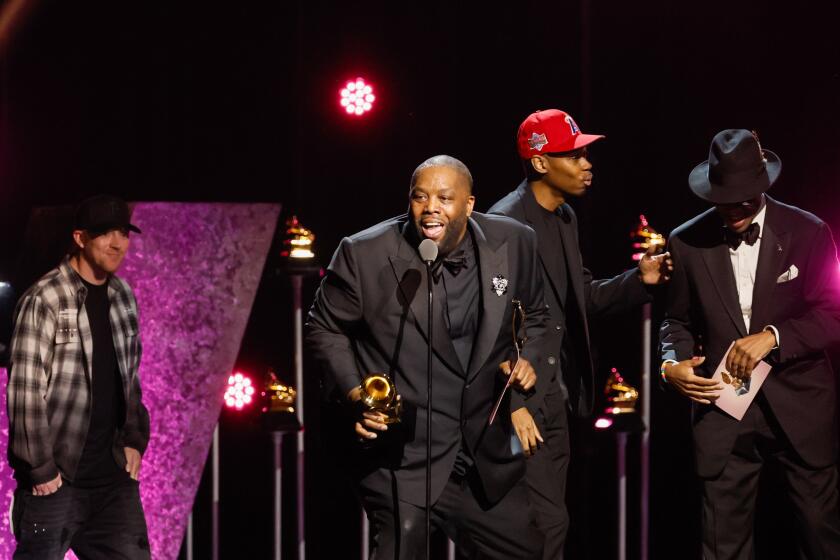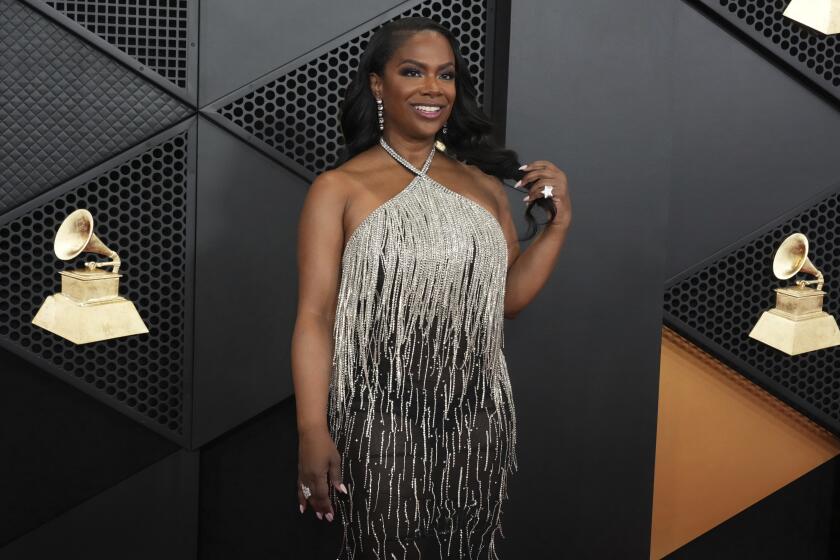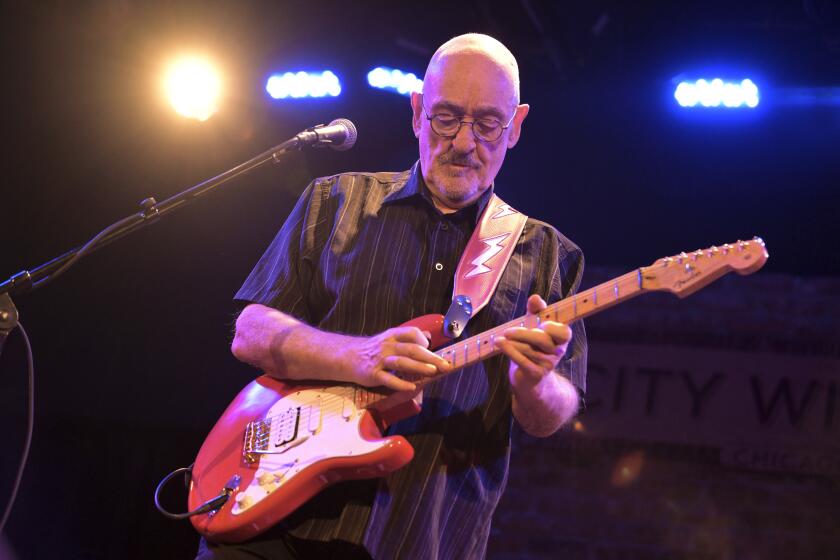Backstage at Grammys with a man in the know
“Excuse me, could you turn down the music? I mean, I like Sinatra, but. . . .” The waiter at the Italian restaurant gave the customer, Ken Ehrlich, a puzzled look before shrugging and walking off in search of a volume knob. Even when he’s sitting beneath dangling Chianti bottles and eating antipasto in Hollywood, the executive producer of the Grammy Awards still has strong opinions about the way music should reach the public.
Ehrlich is one of the most powerful gatekeepers in the music industry and, with nominations for the 50th Annual Grammy Awards due Thursday, his cellphone will soon be burning up with calls from label executives, managers and sometimes artists themselves, all lobbying, demanding or begging to get a moment in one of the brightest spotlights in the music industry. A sparkling performance on the Grammys not only can yield a commercial windfall, it can shape careers.
The 63-year-old Ehrlich knows the pressure of all that (he is only two years removed from a quadruple heart bypass that he partly assigns to the stress of 27 years of the the Grammy show), and he also feels the weight of the history. That’s clear on every page of his just-published backstage memoir, “At the Grammys!: Behind the Scenes at Music’s Biggest Night” (Hal Leonard, $29.95), which, despite the breathless title, is like Ehrlich himself -- understated, candid and impatient with those celebrities he deems arrogant or, worse, possessing only flimsy talent.
Take for example his reprinting of a handwritten note from Britney Spears that arrived on the eve of the 2006 show requesting a spot for her as a presenter (“I wanted to write you personally in hopes that you might find a place for me on the show . . .”). Ehrlich was unmoved; a few years earlier, he had been advised that he shouldn’t speak directly to the star, only to her manager, and he was still seething. In his book, he reports his response to Spears’ overture: “I think we ought to keep the relationship the way it was then.”
All of the expected Grammy moments are accounted for in the memoir, among them the bizarre “soy bomb” incident, when a loopy fan with body paint jumped on stage with Bob Dylan at the 1998 show, and the sublime, last-minute performance of “Nessun Dorma” by Aretha Franklin, filling in for an ailing Luciano Pavarotti that same year.
The more interesting stories, though, are the smaller ones that never made it on camera but reveal just as much about the strange physics of the celebrity universe.
For a lesson in jockeying, there’s the 1991 Grammys, when Ehrlich dearly wanted to book his old friend and idol Tony Bennett, but the Recording Academy leadership balked until Ehrlich had the idea of pairing Bennett with Harry Connick Jr., who was not far removed from his “When Harry Met Sally . . .” success.
Connick was thrilled with the idea that would have him sing and then introduce Bennett, but then, after everything was set, his manager said Connick would drop out of the show unless the performance order was switched -- the younger singer wanted Bennett to “open for him” and introduce him. Ehrlich fumed, but Bennett agreed.
The story doesn’t end there -- Bennett was so sensational in rehearsals that he got a standing ovation from the crew at Radio City Music Hall. Five minutes after that, Connick’s people had a change of heart: They didn’t want to follow Bennett after all. Ehrlich, with some glee, announced that it was too late. “I had no great desire to please the manager,” he writes.
These are not stories Ehrlich expected to be telling the world.
“It started out as notes that I kept just to document things just for myself, to write it all down before my memory went,” he said. “At some point about three years ago I started thinking there could be something in it for other people to read. And there have been a lot of things written through the years about backstage moments at the Grammys that were just wrong. I wanted to show what it is really like.”
Cynics may carp that the Grammys give too much attention to commercialized and disposable music, but Ehrlich says it’s a big tent. To the ringmaster, it’s OK if the crowd cheers for pop clowns now and then as long as they stay tuned for the breathtaking high-wire acts that he loves.
For vivid sentences, how about this: “Bette needs a bucket!” That’s what a frantic publicist told Ehrlich just before a hyperventilating Bette Midler was due on stage one year. The producer scrambled for a trash can and then crossed his fingers when the star went on stage. As far as the audience at home knew, everything was just divine.
“There are some things, some moments, you don’t forget,” Ehrlich said, looking down at his lunch. “That was one of them.”
Ehrlich’s history with the gramophone trophy began as a member of the audience in 1976. The Cleveland native had been working in Chicago on a public-television music show called “Soundstage,” which caught the eye of Pierre Cossette, whose Cossette Productions had launched the Grammy franchise as a network show in 1971. Cossette invited Ehrlich and his then-pregnant wife, Harriet, to L.A. to see the show. Paul Simon and Natalie Cole performed and Ehrlich was smitten.
In 1980, Cossette (whose son John is co-executive producer of the show now) turned to Ehrlich and director Walter Miller to help a show that was drifting into schmaltz. Ehrlich’s “serious music” background helped immediately: Bob Dylan agreed to appear for the first time on the Grammys because he had worked with Ehrlich on a John Hammond tribute back in Chicago.
On that first show, Ehrlich lobbied “hot and hard” behind the scenes to create a special moment by pairing Neil Diamond and Barbra Streisand on a performance of “You Don’t Bring Me Flowers,” a song they had first recorded individually, then in 1978 as a duet. The special tandem performances would become a trademark. Some critics, though, have wondered whether corralling Paul McCartney, Jay-Z and Linkin Park into one number, as Ehrlich did last year, is more gimmicky than golden.
Ehrlich has been thinking for months about the 50th-anniversary show, which will take place Feb. 10 -- he carries a sheet of paper in his pocket full of names and ideas. Don’t bother asking for a peek: “Why would I tell?”
There are, however, some big names that could be in Ehrlich’s sights. Garth Brooks, who is ramping up his career after a quasi-retirement, will be performing five shows at Staples Center less than two weeks before the Grammys are staged in the same building. Michael Jackson, meanwhile, is releasing a 25th-anniversary edition of “Thriller” just four days after the Grammys. Ehrlich tried in 2002 to book Jackson, but the discussions soured when the Gloved One insisted that he be presented with an award of some sort, which Ehrlich saw as a “lack of understanding and respect for us.” The whole thing fell apart soon after.
Ehrlich has a fairly gentle personality (he describes his industry reputation as “reasonable and benign”) and a habit of making glum, self-deprecating comments when the conversation lingers on him.
“Believe me, Hillary Clinton’s book is not in trouble,” he said. “In a way, I don’t know why I did this book; I have this feeling I don’t own this stuff.”
The Eeyore tendency comes across in the book, but so does his impatience for industry hubris and flimsy talents. Ehrlich winces when the subject turns to “15-minute personalities,” as he calls them, and he prides himself that he has turned down the overtures by Paris Hilton, Nicole Richie and other stars whose legacies seems to be as fleeting as a text message.
“I spend more time focused on music and people that will be remembered in the years to come,” he said.
That may be, but Ehrlich has seen “American Idol” beat the Grammys in head-to-head competition, and he has seen that talent show’s glorified karaoke sensibility tilt the Grammys broadcast, which last year had an unknown singer who had been selected by fans perform with Justin Timberlake. There’s also the upheaval in the recording industry. These things don’t sit well with Ehrlich, but he says the music keeps him going.
On Friday, CBS aired a show called “My Grammy Moment,” a two-hour retrospective that Ehrlich labored over intensely and was proud of, but instead of staying home and watching it, he and Harriet went to see James Taylor and Carole King at the Troubadour. Afterward, he was giddy.
“That is what it’s all about -- just great music, timeless music, and it’s the music I used to sing to my kids,” Ehrlich said as he fished for his car keys. “I don’t know how anybody couldn’t feel it or how they couldn’t love it. My job to make sure that they get a chance to see it.”
More to Read
The biggest entertainment stories
Get our big stories about Hollywood, film, television, music, arts, culture and more right in your inbox as soon as they publish.
You may occasionally receive promotional content from the Los Angeles Times.


